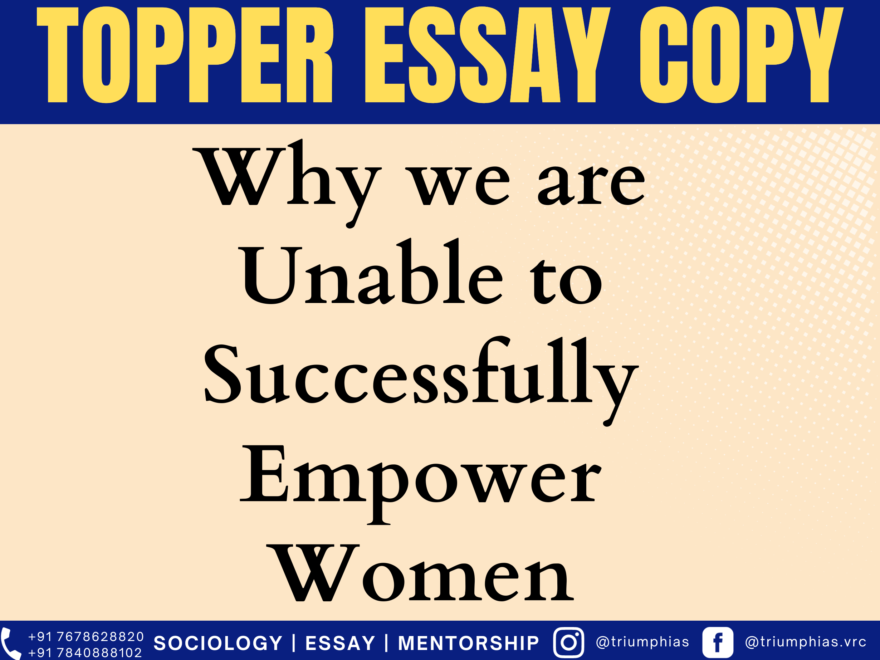
Akshita Gupta
Essay Topic:
Why we are unable to successfully empower women
(Relevant for Essay Writing for UPSC Civil Services Examination)
Why we are unable to successfully empower womenIn a sleepy town of Hyderabad, a veterinarian doctor going back home from night duty faces on her way four youngsters passing and passing absurd comments. It moved further to inappropriate behavior and brutal sexual assault, burning the body of the victim to avoid then and there. What was her mistake? What did she do wrong? An economically and socially empowered woman lost her life without getting the answers to her questions. The above excerpt shows there must be multiple dimensions of women’s empowerment. Lags on one side nullify the ‘success’ of others. This essay will revolve around the central theme of women’s empowerment with various historical evidences, present scenarios, the ultimate reasons of failure despite efforts, and some innovative solutions to ensure “SUCCESS” in their upliftment. From time immemorial, women faced the hurdles in day-to-day lives while struggling to ask for ‘Basic rights”. While the scenario was pretty equal during the earliest civilizations of the Indus valley (e.g., Mother Goddess, dancing girl, etc.), the conditions started deteriorating from the Vedic age and further. Social evils like sati, purdah, etc., imposed restrictions on her “free will”. She was barred from religious teachings and was devoid of any opportunity to rise in power. The aftermath of Razia Sultan concretizes this evidence. It was the devotion, courage, and hard work of social reformers like Raja Ram Mohan Roy, Ishwar Chandra Vidyasagar, etc., that raised her status to “less” far below men. Participation of Rani Lakshmibai, Aruna Asaf Ali, Sarojini Naidu in our freedom struggle set an example for coming generations. But these exemplary evidences are few in number in contrast to the number of issues still prevalent in contemporary times. A fixed social role of nursing, nurturing, and caring for the household binds her legs in a chain of responsibilities. Even if allowed to work, her role just becomes a ‘double burden’. This, along with increasing crime of violence, sexual assaults, dowry deaths, inequality with patriarchy, narrows her limit to be free. Politically too, even after 33% reservation in local bodies (Panchayats and municipalities), she is a victim of “Pati Panchayat” syndrome, “surrogate representations”, etc. Conditions have improved economically but are still unsatisfactory to successfully empower the life of women. Gender pay gap (>1/5th), poor digital inclusion (less than 29% of women have mobile internet facilities), etc. The schemes for her upliftment are mere sources of debates and discussions hence delayed implementations. COVID-19 pandemic further worsened the situation with job loss, impoverishment, domestic violence, triple burden (livelihood, family, and herself), etc. According to the World Bank, there is a higher probability of women going into poverty due to the pandemic. Where are we lagging? Despite numerous programmes, policies, measures, and efforts by the government, civil society & individuals, the empowerment is not manifesting in the way it should. Despite a separate Commission for Women at the national level, a separate ministry for women & children to work upon the success, all efforts are turning futile. The helpline for the safety of women, a special call for crimes against women, special training of officers & police for safety & security, still sexual assault and domestic violence occurs. She is not safe to talk about her problems to herself, leave alone a third person. The force of patriarchy and fear of losing image in society pulls her back every time. Orthodoxy adds fuel to the fire. Even after constitutional provisions ensuring safety and dignity of women (DPSPs, Article 21, etc.), the practicality of theory is causing the failure. This highlights the key issue of implementation which is the cause for almost every hurdle she faces. The nearsighted policies prove to be self-destructive in the future. For instance, after the passing of the Maternity Benefit (Amendment) Act, within a year, many women suffered job loss and economic inequality. The employers were reluctant to offer jobs to her because of the burden. The ongoing debate on the menstrual leave policy faces similar threats. Also, if in the rare case scenario, she gathers the courage to demand rights, equality, and justice, she is humiliated and suppressed in every legal-illegal way one can. The justice delayed is justice denied. Examples of the Nirbhaya case, Shah Bano case justify this argument. She turns out to be a victim of victimization over & over. The government brings out digital platforms for empowerment but neglects the very fact & data of “THE DIVIDE”. Only 29% of women are active internet users, only 66% of women are literate, quantifying the gap that needs to be filled first. The vulnerable sections of tribes, physically challenged, and poor are at a much larger threat. Their exclusion while framing policies brings the whole exercise to the initial point of struggle. Let’s bring success in empowerment when an urban step forward, family, village & nation moves. Women, who spend 95% of their income on their household, will have to step up to highlight her versatile & most dynamic roles in this society. Family is the first unit that can bring the desired change. Her “indomitable will” will form the path of the torchbearer. For where she has opportunities, she will definitely bring the change. For example, during the Swadeshi movement, women participated in large numbers for the first time at a national level. She never took a step back after that. It’s obvious that ‘alone’ she cannot change the dynamics by herself, various stakeholders like the government, society, men, institutions, and the judicial process, etc., have to join their hands together to achieve a common derived goal. This can be achieved by an inclusive approach to cover every aspect of her life with a long-term vision to ensure consistency. Both structural and functional changes need to be instigated in the existing system. Structurally, the “Divide” needs to be plugged by initiatives for digital & literacy inclusion. The Facebook initiative of “We Think Digital” for training women in digital mechanisms in 7 states. Such campaigns need to be started countrywide. Further, protecting the strength of her position and power at the local level e.g., Panchayats. A female sarpanch will definitely work more for sanitation, hygiene, health, safety, education, and upliftment of the whole village. Her innate nature of caring & compassion cannot be doubted. Functionally also, reforms need to be brought into her workplace, in her town/village, in her family, etc. The awareness about her rights, her claims, and rights against civil/criminal wrongs should be strengthened first. For if she knows she is ensured a safe environment, she will bring her maximum potential for the nation. Social media can bring the necessary things we all derive. The campaigns like #MeToo, #NariShakti, and ideas of feminism for the protection of rights at par with men show futuristic potential. After highlighting the detailed image, I would like to conclude this essay with famous lines by Rupi Kaur, “For when women have the right to choose, Magic happens!” Let that magic happen in each and every corner of this world to make it equal and free for all. |
To master these intricacies and fare well in the Sociology Optional Syllabus, aspiring sociologists might benefit from guidance by the Best Sociology Optional Teacher and participation in the Best Sociology Optional Coaching. These avenues provide comprehensive assistance, ensuring a solid understanding of sociology’s diverse methodologies and techniques
Meta Tags:
Urbanisation, Blessing, Disguise, Economic Growth, Cultural Diversity, Environmental Challenges, India, Social Inclusion, Sustainable Development, SDG Goals, Urbanization is a blessing in disguise, Laxman Tiwari, Laxman Tiwari upsc, Laxman Tiwari CSE, Laxman Tiwari Essay copy, Laxman Tiwari Essay test copy
Why Vikash Ranjan’s foundation Classes for Essay?
Proper guidance and assistance are required to learn the skill of writing essay topics in CSE examination. VIKASH RANJAN SIR at TRIUMPH IAS guides students according to the Recent Trends of UPSC, making him the Best Essay Teacher for Essay writing UPSC.
At Triumph IAS, the Best Essay Writing Coaching platform, we not only provide the best study material and applied classes of Essay for IAS but also conduct regular assignments and class tests to assess candidates’ writing skills and understanding of the subject.
Choose The Best Essay Writing Teacher for IAS Preparation and Know our Approach for Essay?
- The Programme is Planned & Executed in a Way that You Write a good Essay for obtaining Effective Score of 140 Plus.
- In this programme we provide Classes on
- How to INTRODUCE The Topic in Context of the THEME of the Essay
- How to Elaborate & Explain the Topic-Theme on Temporal Scale & Sectoral Scale as well as Intellectual Scale in the MAIN BODY of the Essay.
- How to Sum up the Topic in CONCLUSION in Context of the Essay Topic Theme.
- ︎We will Teach You How to use the Knowledge Matrix of General Studies & Optional to write a Good Essay more Logically and Coherently.
- After the Classes You have to “Write to Learn & Learn to Score” .This means You have to Write the Essay Test Papers & Learn from the Feedback & Discussions.
Why Essay is Important and What We Offer in “Essay Test Series”?
- Triumph’s Essay Upgradation Test Series (Under Personal Guidance of Vikash Ranjan Sir) doesn’t only focus on improving student’s linguistic skills but also focus on improving student’s ability to comprehend the topic-sentence (subject) recall & relate the facts, concepts, propose thesis-statements, and logically assimilate the ideas & counter ideas with clarity in expression on temporal & Sectoral Scales of knowledge.
- Further students are provided one-on-one INTERACTION* Session with Vikash Ranjan Sir. Students get personal feedback on their strength and weaknesses, regarding what is ‘good about their essay and what more should be done to make it a better one’ by Vikash Ranjan Sir.
Why to take up this “Essay Test Series and Foundation” Course?
- Essay is Low hanging Fruit. Marks in Essay is Effectively Contributing in Final Selection in New Pattern of Mains Exam. With a Well Developed ‘Knowledge Matrix and Rigorous Practice’, One can Score upto 160 + in Essay. So IAS Aspirants should never Ignore Essay Preparation
- Inculcating Writing Competency in Essay for IAS, which is Different from Essay in English, Essay in School and College.
Follow us :
🔎 https://www.instagram.com/triumphias
🔎https://www.youtube.com/c/TriumphIAS
🔎https://t.me/VikashRanjanSociology
Find More Blogs…
| Compare and contrast Karl Marx’s and Max weber’s | Karl Marx- Historical Materialism |
| Position of Women In the Modern Indian Society | Sociology: Social system and pattern variables |
keyword: Unable to Successfully Empower Women, Unable to Successfully Empower Women, Unable to Successfully Empower Women, Unable to Successfully Empower Women, Unable to Successfully Empower Women, Unable to Successfully Empower Women, Unable to Successfully Empower Women, Unable to Successfully Empower Women, Unable to Successfully Empower Women, Unable to Successfully Empower Women, Unable to Successfully Empower Women, Unable to Successfully Empower Women, Unable to Successfully Empower Women, Unable to Successfully Empower Women, Unable to Successfully Empower Women, Unable to Successfully Empower Women

